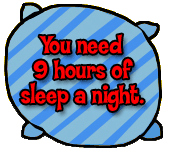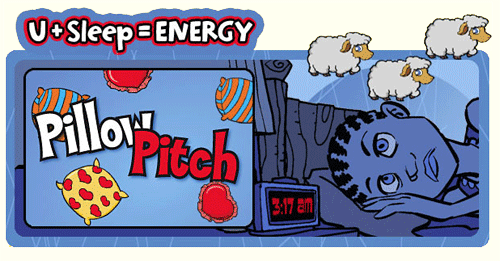ENERGY EQUATION + SLEEP

Sleeping Tips
Falling asleep isn’t as easy as falling off a log. To fall asleep and sleep well, try these tips:
- Go to sleep and wake up at the same time every day, even on the weekends.
- Our brains are built to sleep when it’s dark. Changes in light help us know when to sleep and when to be awake. (You ever notice how it’s harder to wake up on dreary, rainy days?)When it’s dark, your brain makes a chemical called melatonin that makes you sleepy. When you’re in the light, your brain shuts off the melatonin.

Light wakes you up, so your room should be dark when you sleep. Even the light from a television or computer screen can make it harder to fall asleep. A dim nightlight is okay. You should get into bright light as soon as possible in the morning to help “turn off” melatonin and wake you up! Turn on the light, pull back the curtains, or go outside to check the temperature.
- Know your body’s daily rhythm. For example, if you get sleepy early in the afternoon, and you have class, try to move around right before. That’ll wake you up so you’re not snoozing. If you’re more of a night person, schedule exercise after school, not when you wake up in the morning.
- Don’t drink coffee, sodas with caffeine, or drinks and snacks with lots of sugar. They can make you feel too wired, and caffeine can make it hard to fall asleep even hours later.
- Being active can help you sleep better, but don’t exercise less than 3 hours before bed—getting your blood pumping like that can make it hard to fall asleep. Take a cue from the sun and start gearing down when the sun sets.
- Relax before going to bed. Avoid anything that requires serious concentration, like heavy reading or studying, within an hour of going to bed.
- Use your bed only for sleeping – don’t do homework or talk on the phone when you’re in bed. That way, your body starts to know that once you’re in bed, it’s time for sleep.
Why do we sleep anyway? That’s 9 hours I could be playing video games, practicing my free-throw, or even studying—what a waste!
No way is sleep a waste! Sleep is an important a part of your health and energy—it ranks right up there with diet and exercise. Sleep gives you the energy to play video games and basketball, and to study. Even if you could study for 9 hours straight without getting tired, you’ll remember what you studied more if you sleep after studying. While you sleep, your body stores memories. And not sleeping enough can make you clumsy—that’s no good while you’re on the court. While you sleep, your brain releases the hormones that control your growth. If you don’t sleep enough, you may be tired, cranky, klutzy, and forgetful.
While scientists are a little baffled about why all this recharging can happen only when we sleep, they all agree that we do need to sleep.

- Page last reviewed: September 25, 2017
- Page last updated: September 25, 2017
- Content source:



 ShareCompartir
ShareCompartir